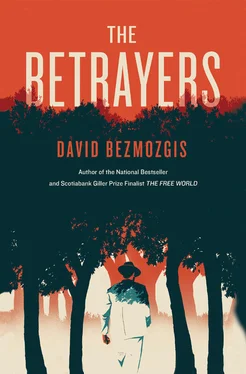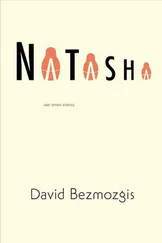To walk the kilometer was never pleasant. In summer, even at nine in the morning, the heat could already be burdensome. By the time Tankilevich arrived at the synagogue, his handkerchief would be wet. In the winter, if it snowed, the way was slick and treacherous. In the spring and fall, there were cold, spiteful rains. But in any season, even in the mildest weather, there was still nothing to enjoy about the trek. The neighborhood where the synagogue stood was one of the worst in Simferopol. Even by the deplorable standards of the time, the roads and sidewalks were in terrible disrepair. So too the houses — huddled, dark, flaking and eroding. Trees and weeds grew wild. Refuse littered the streets. Cadaverous old women and dogs picked through it. Beginning in the afternoon, local toughs emerged, drinking and cursing. Into this midst many Jews were reluctant to come. Of those who did, their numbers were shrinking. It was a matter of attrition. When one of them departed — now almost exclusively in the eternal sense — nobody replaced him. They had counted seven men. Then six. And now, with the death of Isidor Feldman, five. Not including Manya Grinblatt and Shura Feyn, the two women.
Past a parked van and a broken chair, Tankilevich reached the synagogue. Its exterior was crumbling, the paint on its wooden window frames blistered. To gain entry, one went around to the side and through an iron gate wide enough to admit a car. On Saturday mornings, this was left unlocked. Then the narrow lane that separated the synagogue from the neighboring house — an ordinary residence like all the other residences on the street. The synagogue was tucked away, secreted here as in meaner times. Unless someone knew different, there was nothing to identify the house. Only the Jewish faces that doddered in on Saturday mornings.
Like the gate, the side door was also unlocked. Beyond, there was a dim cool hallway that offered Tankilevich his first instance of relief. The house may have been in a sorry state, but it had been properly built, close to a century ago, with walls thick enough to contend with the extremes of the climate. A few steps and he could hear more clearly the voices in the prayer room. Voices raised not in prayer but in routine, familiar disputation. Tankilevich pulled open the door and saw them. He thought, Here they are, my companions of ten years. God grant I not see them again until I choose.
He went to his customary place, at the rearmost of two dark mahogany tables. Each table had three chairs. Normally Isidor Feldman and Hilka Berezov, Nina Semonovna’s brother, occupied the two other seats at his table. But Isidor had died of a stroke that past Tuesday, and Hilka, at fifty-four the youngest and most affluent among them, had closed the electronics shop he owned near the train station and taken his wife and children for a week to Kerch. So Tankilevich had the table to himself. Moshe Podolsky, the elderly Nahum Ziskin, and Nahum’s son Pinya were at the other table, nearest to the bimah, from which the Torah was intended to be read. To their right, on chairs positioned against the wall, in an approximation of a separate section, were Manya Grinblatt and Shura Feyn.
Golden light poured into the room through four tall arched windows on the opposite wall. In this light — and in the light of his imminent leave-taking — the prayer room and its occupants were nobly cast. The shabbiness that marked the rest of the building and the neighborhood was not to be found here. The mahogany tables and chairs were sturdy, built for epochs. The bimah and the ark beyond it had already withstood the darkest times. Somehow they had been rescued from the conflagration. The bimah — a raised platform and table — was lacquered black wood with flashes of gold. The ark was the same, gilded and carved, its doors concealed behind a burgundy velvet curtain trimmed, tasseled, and embroidered in gold. Above hung two crystal chandeliers. The walls were whitewashed, the room clean. And of his companions, awash in this light? History had laid its heavy hand on them, but they had burrowed, eluded, resisted, and remained. One needed only to look at their faces — expressive Jewish faces — to see that they had known the depths of life. Let no one say that he lacked feelings for these people and this place, Tankilevich thought. Neither was he deserting them. Deserting them for what? He would be the one with the void in his life.
Moshe Podolsky was jabbing the air with his finger as Tankilevich lowered himself into his seat.
— This, this is precisely why I left that country! Podolsky declared.
Tankilevich immediately grasped the substance of the conversation. Israel. His blood quickened.
Podolsky, in his olive army cap, had risen from his chair to more emphatically make his point to the two Ziskins and the women who followed the discussion from their places along the wall. A minute turn of his head, and Podolsky now included Tankilevich as well.
— What do the Arabs do? They throw rocks. They attack innocent women and children. They shoot rockets. If they pay a few shekels in tax, where does the money go? To their crooked Palestinian officials, who, if such a thing is possible, are more corrupt than our Ukrainian ones. Meanwhile, the Jews pay money to the state. In Israel, they pay taxes, and from America they send how many millions. And what does the state do with this money? It commands Jewish soldiers to evict Jews from their homes.
— Of course, Nahum Ziskin said, it’s only in Israel if a Jew builds a house it’s a crime.
Even more than the prayers, Tankilevich would miss such conversations. With whom else could he speak this way? In Yalta, surrounded by goyim, he could talk like this only to himself. To speak like this even with Svetlana was to stir up turbulent feelings.
Podolsky, born Mihail but reconsecrated as Moshe, had lived in Israel for three years in the late 1990s before returning to Simferopol. His reasons for returning, Tankilevich still found murky. Podolsky ascribed his departure to his frustration with the state, its pandering to the Americans and the Arabs at the expense of the Jews. Was this reason enough for a person to leave a country like Israel and return to one like Ukraine? But Tankilevich, given his own biographical infelicities, did not pry. In this country, at this point in time, a man was entitled to his secrets, his fabrications. If Podolsky gave as his reason for leaving the ideological incongruities between himself and the state of Israel, then it was best not to scrutinize too closely. If it seemed odd that Podolsky, still ardent in his Zionism, when restrained from living in Judaea or Samaria, had opted for Simferopol over Jerusalem or Haifa, it was best to regard this as no more than a personal quirk. The man had been in his middle forties when he’d returned. He had a wife and son. The economic situation in Crimea in the 1990s had been even worse than it was now. Would a man hazard such a move based purely on political discontent? Since then, Podolsky’s son had, of his own accord, re-immigrated to Israel. But Podolsky had stayed. Tankilevich knew it wasn’t because he was prospering. He was a heating technician; his wife was a bank teller. What held them? It wasn’t love for Crimea, Ukraine, Russians, or Tatars. Podolsky’s life revolved around Judaism and Israel. He oversaw the synagogue, unlocking the doors every Saturday morning. He wore his olive army cap in solidarity with the Jewish settlers. He kept abreast of the latest developments in Israel, even reading the Hebrew newspapers on his computer. Tankilevich was not alone in wondering what precisely had happened to Podolsky in Israel. What act had he committed that kept him from returning to the place where his heart so clearly resided?
The question of Israel, of why they had not relocated there, pertained to them all. Why did they persist here? Nahum Ziskin was eighty-five years old. Too old to leave, too old to make a new start. Pinya, his son, had never married and, with a mental deficiency, had never lived apart. What would become of him when Nahum died? They were sustained now mostly by Nahum’s German reparations. When Nahum was gone, that money would cease. Manya Grinblatt’s husband was Ukrainian and had no desire to live in Israel. Shura Feyn, a widow, was as old as Nahum Ziskin and frail. Her daughter had married a Russian and moved to Siberia. Hilka Berezov had been deliberating for years whether to stay or go, his inclinations fluctuating with the fortunes of his electronics business. And Isidor Feldman, a man with a sense of humor, always maintained that he would have left long ago if he hadn’t already bought a plot next to his wife at the Jewish cemetery and didn’t want some stranger taking his place. Now this was no longer an issue.
Читать дальше












